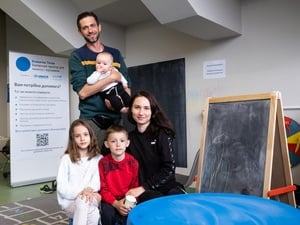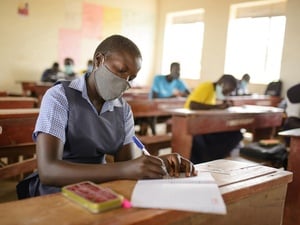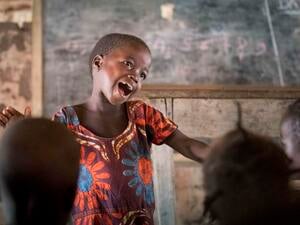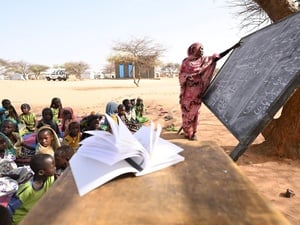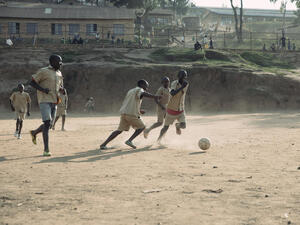Lebanese war children need their dreams to survive
Lebanese war children need their dreams to survive
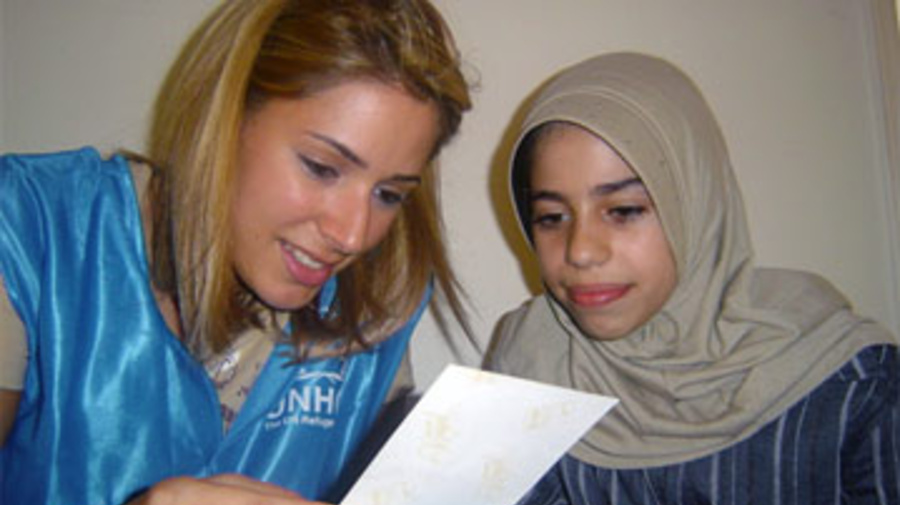
Fatima and a UNHCR staff member look at photographs recovered from the rubble of the young girl's home.
CHOUEIFAT, Lebanon, September 1 (UNHCR) - Fatima huddled with her family in a basement through five days of bombing before fleeing Beirut. When the war ended, the 11-year-old girl returned to find her home a pile of rubble, and the family is still searching for a permanent residence.
But the story Fatima told UNHCR staff monitoring the condition of the thousands of Lebanese who remain displaced is also one of hope and courage. She has survived, and her aspirations have not yielded to the displacement and violence.
"I want to become a journalist one day and go on TV to tell my people about my country, and also to make people happy, and be of use," Fatima said. A native Arabic speaker, she knows English and worked as a volunteer interpreter for foreign aid workers at the school that sheltered her family.
"I was truly impressed with her ability to communicate with people in a very mature way, by her thirst for knowledge. She will have a brilliant future, if given the opportunity to live up to her dreams," said a UNHCR field officer in the Metn governorate.
Lebanese children have been particularly victimised by the latest war in Lebanon. As well as many dead and injured, children like Fatima suffered psychological wounds. But their resilience is evident in their dreams and ambitions.
When the war broke out, Fatima and her family hid for five days in the basement of their house in Haret Hreik in the southern suburbs of Beirut. The quarter was repeatedly targeted by Israeli air and sea strikes throughout the 33-day war.
"The first day in the basement, I couldn't sleep because of the heavy bombing. I was so afraid for my family; if they die what would happen to me? I would have stayed alone in this world," said Fatima.
Fatima's mother has shown signs of severe depression - an added burden for her children. The trauma of the war still haunts her.
"I huddled my four children in one big embrace so that we would all share the same destiny. If we died, we'd go together to heaven. We prayed together in the huddle. I couldn't stand the idea of losing one of my loved ones. We were one united family," she said.
As the bombing of their quarter escalated, the family fled. "We started running and my father was shouting: 'Faster, faster. The bombing can resume at any moment'," said Fatima. That night their home was flattened by a rocket.
Fatima has discovered her own coping mechanism. "When I am sad or afraid, I confide in my diary. I vent all my feelings and thoughts, and then I am totally relieved."
Writing has always been Fatima's passion; one she maintained in the school in Kesrouane where the family found shelter. Until she made new friends, writing was her only way to cope with the difficult surroundings.
"Living in the school was a whole new experience for me. I wrote a lot and documented my feelings and thoughts. I wanted to remember these significant moments in my life," she said.
When the ceasefire took effect on August 14, Fatima and her family woke early. It was the moment they had all longed for and they left immediately for home.
"When we first saw where our house had been, we were in shock," her mother said. "My husband had to point out to me the location. What was once our home and the roof over our heads was now simply ruins. At first I was in disbelief. I could not believe my husband. I was unable to recognise my own neighbourhood."
Fatima was afraid to search the rubble, fearing she would find a dead body, or perhaps a head or hand. "I couldn't recognise my own house. The bathroom was now inside the kitchen and the kitchen was inside the living room," she said.
The family has not settled yet. At the moment they live in a rented apartment in the Choueifat area of Beirut. They hope to return one day to the place that had been home for all of Fatima's life. Currently on summer break, her parents have not yet found Fatima and her siblings a school.
Fatima sees that as only a momentary problem. Her big green eyes reflect her indomitable spirit and her unbowed ambitions - but they also hide the fear that is now inside an 11-year-old child.
"One day, when I become a journalist, I will warn people about the inhumane nature of wars," she said. "But what if the war starts all over again?"
By Laure Chedrawi and Vanessa Raphael in Choueifat, Lebanon


